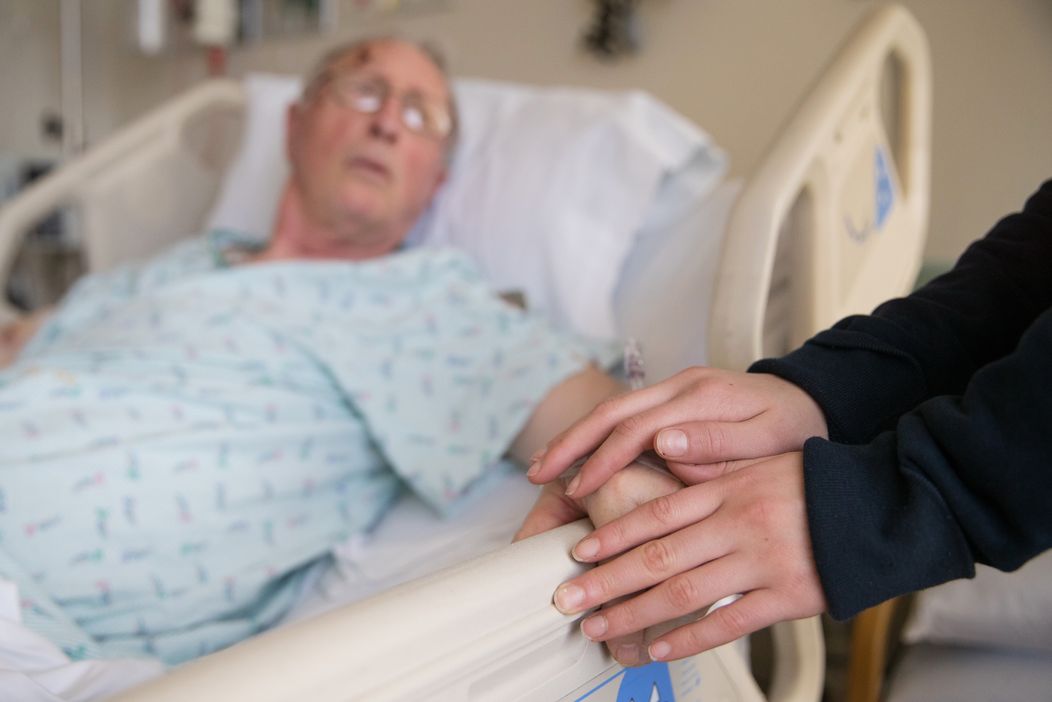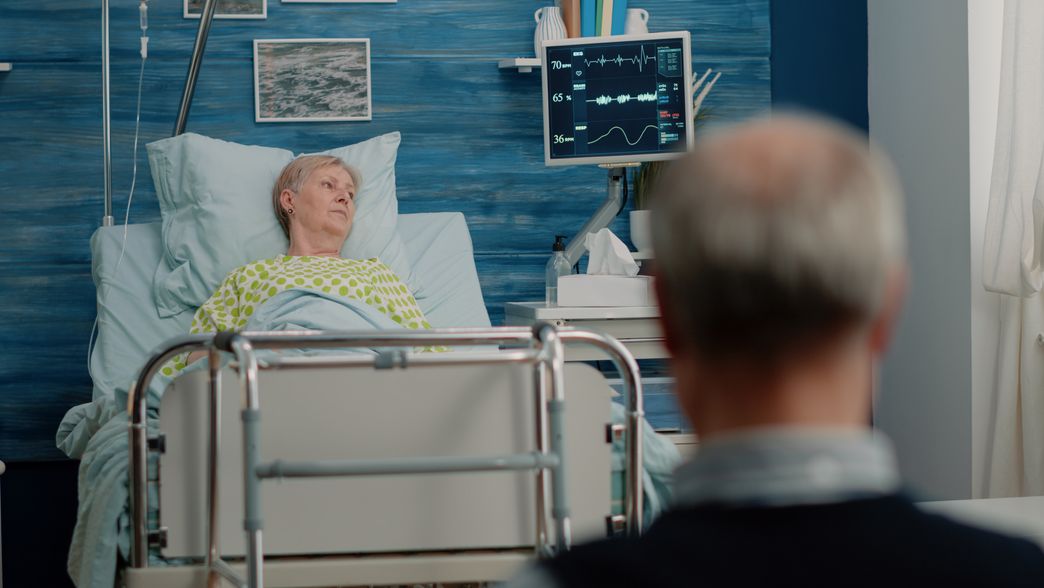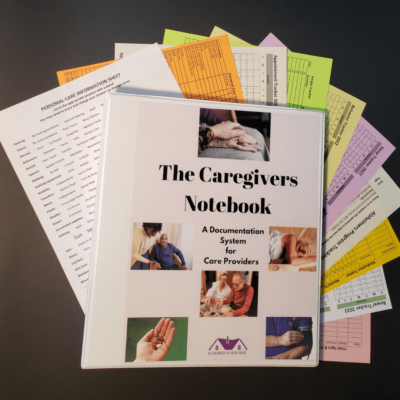The Alzheimer’s Hospital Stay
An Alzheimer’s hospital stay can wreak havoc on your loved one. A hospital is frightening for most people, but for someone with Dementia, it can be terrifying. They are no longer in their familiar surroundings and routine, but they are in an unfamiliar place surrounded by people they do not know.
Why are they in the Hospital
A frequently asked question is can you be hospitalized for Alzheimer’s. Unfortunately, the answer to that question is yes. Often people are taken to the hospital for a sharp increase in confusion. However, most people admitted to the hospital with Alzheimer’s are admitted for a different reason. Hospital admissions are usually due to fainting, falling, trauma, heart disease, or stomach issues. You can find more facts & figures regarding Alzheimer’s here.

Do Dementia Patients Stay in the Hospital
Yes, suppose the hospital visit reason is for increased confusion. In that case, the hospital will usually keep them overnight to assess the reason for the change. Sometimes, the family decides it is time for placement in an extended care facility and this can be the stepping stone needed to initiate placement.
Suppose the admission reason is a medical condition in someone who also has Dementia. It may complicate the treatment plan and prolong the hospitalization. Often a hospital stay with a common medical condition is extended for someone with Dementia. However, they are also at a higher risk for complications during their stay.
What is it like to be in a Hospital with Dementia?
Most hospital staff have limited training in Alzheimer’s disease and related dementias. As a result, many don’t know the best way to interact with someone with Dementia in a way to prevent agitation.
Not only do they not fully understand how to interact with Dementia patients but they are usually very busy. The nursing staff want to give great care but, they have a full workload and are busy completing their assigned tasks for the shift.
They don’t have the time needed to go slow. Often, their rushed pace leads to increased frustration and agitation in your loved one. That agitation can easily escalate to a behavior emergency. The hospital staff doesn’t know your loved one like you do. They don’t know what calms them. When a behavior emergency happens, their response is to give behavior medications and place restraints.
Alzheimer’s Hospital stay alone
What happens if you leave a dementia person alone in the hospital?
Firstly, it is challenging for someone with Alzheimer’s to be in the hospital alone. They struggle with the call light system because it is too complicated to understand.
Secondly, your loved one is in a strange, unfamiliar place and they just want to go home. However, they don’t know how to call for help, order food, find the toilet, use the phone, or manage the television.
Thirdly, strangers keep popping into their room, trying to take their clothes off and poke things into them.
Alzheimer’s Hospital care for patients usually revolves around the hospital’s schedule.
Therefore, the medication and meal times are different than at home. Most hospitals switched from scheduled routine trays to self-ordering whenever the patient was hungry.
That works well for the alert and oriented patient, but what about someone with Dementia? Your loved one depends on the staff to order their tray and help them eat. Unfortunately, trays often get ordered late, and when they arrive, they may sit at the desk and get cold. Keep in mind, there may be 10 patients on the unit who all need to be fed and only 5 nursing staff to help.
If you are there to help with your loved ones meals, it is a great help to the nursing staff.
Nights during the Alzheimer’s Hospital stay
Sleep time in the hospital is interrupted every couple of hours for vital signs or toileting. For many Dementia patients once they settle down and get to sleep, then someone they don’t know wakes them up in the middle of the night.
Once they are woken up, they are confused which leads to agitation/aggressive behavior.

Dementia Worse After a Hospital Stay
Often, that answer is yes. However, many people have drastically declined after a hospital stay. Recognize that this is a real possibility. An Alzheimer’s Hospital stay can cause more confusion.
On the other hand, many patients entered the hospital with reasonably high functioning with their Dementia. Unfortunately, they could not return home due to the severe disease decline.
The change in location, anesthesia or medication changes is usually the cause of the increased confusion. Incontinence problems are also worse after a hospital stay. Often a catheter is placed, and they get out of their toileting routine. As a result, it is difficult to regain bladder control and they may remain incontinent.
Alzheimer’s Hospital Beds
The length of stay in a hospital varies for those with Alzheimer’s, especially if there are complications. However, once they are medically stable, they must be discharged from the hospital. Many families struggle with the decision to release the patient and try to keep their loved ones in the hospital longer.
Covid stressed all the hospitals and created many complicated patients who still go in and out of the hospital. As a result, hospital beds are in high demand, and it shows no signs of letting up.
Hospitals are now caring for sicker and more severe patients than ever before. Extended care facilities have now become step-down units. Many patients are sent to a facility to continue therapy or IV antibiotics.
Discharge Planning for an Alzheimer’s Hospital stay
Discharge planning begins on the day of admission to the hospital. Home care needs such as safety, caregivers, and equipment are reviewed. Every hospital has several discharge specialists. Their title may be a discharge planner or a case manager, but this is the person you will need to talk to about needs at the time of discharge.
Discharge to a Facility?
This term is often discussed for Alzheimer’s patients in the middle to late stages. Especially if the family is struggling or there are signs of Caregiver Burnout. This is the time to review all the options available in your area. The hospital discharge planner can access many resources you may not know even exist.
If they are in the hospital for more than 1-2 days, they may need to go to a rehab facility. The reason is usually due to the need for physical therapy for strengthening, IV antibiotics, or respite care. SO don’t be surprised when they bring it up.

Shelter of Calm:
Your Guide Through Dementia's Storm!
Is Dementia's chaos stealing your peace?
We're here to restore the calm, empowering you to confidently face each challenge.
Take the first step towards transformation now.

What is Hospital-Induced Delirium?
Delirium is scary! It comes on quickly and can become a medical emergency. Unfortunately, many hospitalized Dementia patients develop Delirium. Various factors, including surgery, infection, isolation, dehydration, poor nutrition, and medications, can cause it. Sometimes it will last for an hour, but it usually lasts a couple of days, and some people never return to their previous state.
Basically, I see Delirium daily at the hospital where I work.
Treatment for Delirium consists of trying to identify the cause. Unfortunately, people who develop Delirium often become very aggressive and are given behavior medications to keep them from harming themselves or others. Generally, this medication can add to the confusion.
Delirium can last for an hour or days; some people never return to their previous state. It is prevalent in elderly hospitalized people and especially those with Dementia. It is a daily occurrence in most hospitals.

How Family Can Help While in the Hospital
Be prepared; keep a list of their medications, doctors, and current conditions. Have all their information in one place to grab and take with you.
It should include:
- The name they liked to be called
- Who is the power of attorney
- Foods they like to eat
- Drinks they like
- Their daily routine
- Medication routine
- How do they bathe, and when
- Communication tips
- How active are they
- Toileting routine
- Sleep pattern
- Topics to reminisce about
- Any religious or cultural preferences
- What calms them when agitated
- Types of behaviors they have
The Caregivers Notebook is the perfect place to keep all the needed information.
Stay With Them if Possible
You or another family member should stay with them if at all possible. Many caregivers consider hospitalization a break from caregiving and stay home to get some much-needed rest. However, you are still needed. Nurses and doctors will need you to help answer questions and will need you to be the patient liaison for your loved one.
So, if possible, pack a bag and set up camp in that room. Be there to recognize if Delirium is coming on and alert the staff to the changes. Here are a few tips to help both of you during a hospitalization.
- Ask for a recliner so you have a comfortable place to sleep
- Help the person fill out menu requests
- Remove personal clothes from sight
- Listen to soothing music or try comforting rituals, such as reading, praying, singing, or reminiscing
- Bring in familiar objects, such as photographs of family members or a pet
- Build a relationship with the nursing staff
Do not assume that the staff understands the realities of caring for someone with Dementia.
Instead, help them to understand your loved one and their needs. Try to avoid taking your loved one to the hospital if possible, for both your sakes.
Know the wishes of your loved one. Learn the difference between aggressive care and comfort care and what they desire as the disease progresses. If you or a loved one is in the early stages of the disease, complete the Dementia Advanced Directives.
It is imperative to know what type of medical care is wanted as Dementia worsens.

The Dementia Caregiver Blog Library
Activities, Advanced Directives, Agitation, Apathy, Approach, Apps for Caregivers, Basic Caregiving, Bathing, Bathroom Safety, Caregiver Burnout, Caregiver Compassion, Caregiver Emotions, Caregiver Help, Caregiver Loneliness, Caregiver Support, Cold & Flu Season, Communication Challenges, Dehydration, Dementia Complications, Dementia Doctors, Dementia Safety Home, Dementia Types, Dementia-Friendly, Dressing Issues, Driving Safety, Eating Problems, Fall Prevention, Family Help, Finances, Guns & Dementia, Harm Prevention, Healthcare, Help at Home, Hiding Dementia, Holidays, Hospice, Hospital Stay, In-Between Stage, Kitchen Safety, Laughter, Legal Healthcare, Marijuana use, Medication Tips, Music, Nutrition, Pain, Patience, Poop Problems, Relationships, Reminiscing, Routine, Safety, Sense of Purpose, Shadowing, Sleep Issues, Stages of Dementia, Sundowning, Television, Time Travel, Traveling, Toileting, Wandering
Exploring Caregiving Tools & Resources? Don't Forget to Check Out My Resource Page! 🌟

Hi, I’m Larea, a Certified Dementia Specialist and Registered Nurse with 30 years of hands-on experience helping dementia patients in various settings, from hospitals to nursing homes and hospice. Drawing on personal experiences with my family members and patients over the years, I’m here to help guide you on your caregiving journey.



0 Comments